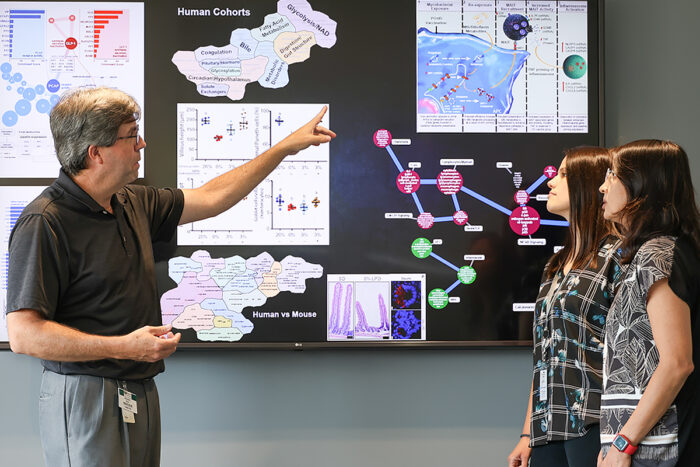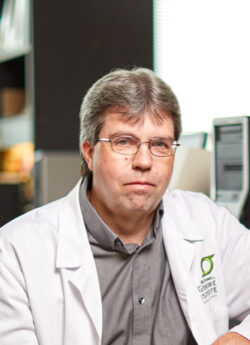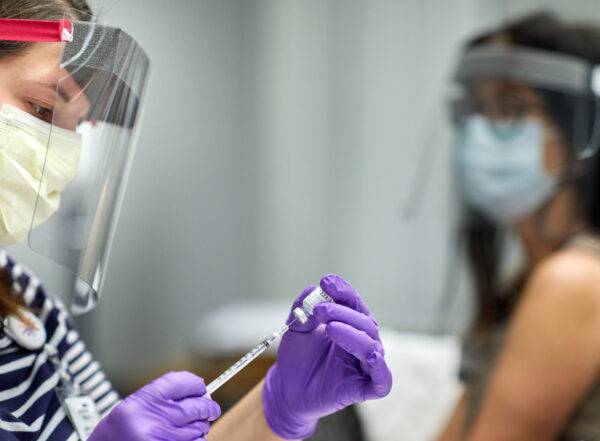WashU Medicine launches Center for Translational Bioinformatics
Center will support new collaborations, infrastructure to accelerate precision medicine
 Marina Fanning
Marina FanningWashington University School of Medicine in St. Louis has formed a Center for Translational Bioinformatics. The goal of the center is to accelerate translational research that can improve patient care by integrating comprehensive patient data and expansive genomic datasets. Richard Head (left), the center's inaugural director, discusses data with Brittany Smith, PhD, (middle) a bioinformaticist at the center, and Ruteja Barve, PhD, (right) an assistant professor of genetics.
Washington University School of Medicine in St. Louis is launching a Center for Translational Bioinformatics, an innovative joint effort of the university’s McDonnell Genome Institute and the Institute for Informatics, Data Science & Biostatistics. The center will bring together experts from diverse fields to accelerate precision medicine research and improve patient care by integrating comprehensive patient data and expansive genomic datasets.
By developing cutting-edge analytical methods and tools, the center will support initiatives for personalized diagnosis, treatment and prevention of many conditions, including cancer, cardiovascular disease and neurological disorders.
“Washington University is a powerhouse of genomic research and a leader in developing innovative ways to apply the tools of informatics, data science and AI to challenging problems in health care,” said David H. Perlmutter, MD, executive vice chancellor for medical affairs, the George and Carol Bauer Dean of the School of Medicine and the Spencer T. and Ann W. Olin Distinguished Professor. “This new center will connect molecular data of all types to patient care in pioneering ways, opening the door to precision treatment strategies that likely would not be possible without these types of collaborations.”
The new center will be jointly overseen by Jeffrey Milbrandt, MD, PhD, the James S. McDonnell Professor of Genetics and executive director of the McDonnell Genome Institute (MGI), and Philip R.O. Payne, PhD, the Janet and Bernard Becker Professor and director of the Institute for Informatics, Data Science & Biostatistics. Richard Head, a professor of genetics and of pathology & immunology, has been named the center’s inaugural director.
MGI is world-renowned for its ability to generate and analyze massive quantities of genomic, proteomic, metabolic and other types of biological data for use in clinical and basic research. At the same time, the Institute for Informatics, Data Science & Biostatistics has developed sophisticated means to identify comprehensive clinical characteristics derived from patient records while ensuring patient privacy and confidentiality. The center will combine these capabilities to integrate existing and future biosample collections with corresponding biomolecular, imaging, clinical, and population-level data across Washington University. Doing so will accelerate the development of new disease diagnostic, therapeutic and preventive strategies, according to the center’s leadership.

“The new center will serve as a hub for efforts in personalized medicine for all Washington University investigators,” Milbrandt said. “In recent years, the pace of technological advances in DNA sequencing, genome editing, imaging, and mass spectrometry has been astounding. Yet, linking those datasets to clinical information for advancing personalized medicine has proven difficult. We are working with our colleagues in the Institute for Informatics, Data Science & Biostatistics to create this new center to provide these links and promote new diagnostic and therapeutic efforts at the School of Medicine.”
A critical goal of the center is to create a technology platform that allows investigators to ask questions that bridge the gaps between clinical, genetic and other research datasets as well as knowledge and data available in the scientific literature. While such questions have long been pursued on smaller scales, this new resource will allow discovery science across a broad range of diseases and biological systems by utilizing the multitude of datasets produced at Washington University through its clinical and research activities.
The center’s resources will help clinicians and researchers identify patients who may be excellent candidates to participate in clinical trials evaluating investigational drugs and, when possible, genetically targeted treatments.
Further, the center will provide resources to help collect and store patient biosamples to be used for molecular analyses. The center also will create tools that will connect such molecular analyses with associated clinical data in ways that allow for new discoveries to be made while preserving patient privacy. These biosamples and the datasets generated from them will provide an important foundation for the types of analyses that are needed to inform personalized medicine approaches, such as the application of deep learning methods to identify previously unknown patterns in such data.
The ability to correlate large-scale analysis of proteins in blood samples from patients with defined genomic abnormalities, treatment responses and disease phenotypes also could lead to new disease biomarkers and diagnostic tests. For example, such a system could sift through clinical bloodwork test results to identify hospitalized patients with kidney failure who also have a genetic susceptibility to kidney disease. Patients meeting these criteria could then be invited to participate in a clinical trial of an investigational drug for kidney failure that targets their genetic risk factor.

“Infrastructure for data mining is one of the cornerstones of these efforts,” Head said. “We will be connecting disparate types of information on a massively different scale than has been done in the past. The analytical platform we develop will contain components of artificial intelligence and machine learning and will be an amalgam of the best methods for given tasks.”
The biosample collection will include a high-capacity robotic freezer that can store more than 10 million clinically annotated biosamples from patients who have consented to participate in research. The biosample collection will be overseen by Mark Watson, MD, PhD, the Gladys G. Smith Professor of Pathology & Immunology, who directs the Siteman Cancer Center Tissue Procurement Core.

“With the explosion of data science and artificial intelligence tools that we can utilize to link and understand complex biomedical data sets, Washington University and our partners at BJC HealthCare are uniquely positioned to implement data-driven personalized medicine initiatives on an unprecedented scale,” said Payne, who is also associate dean for health information and data science, and chief data scientist for the School of Medicine. “This new center will facilitate the transdisciplinary connections necessary to conduct this type of clinical and translational research well into the future.”







